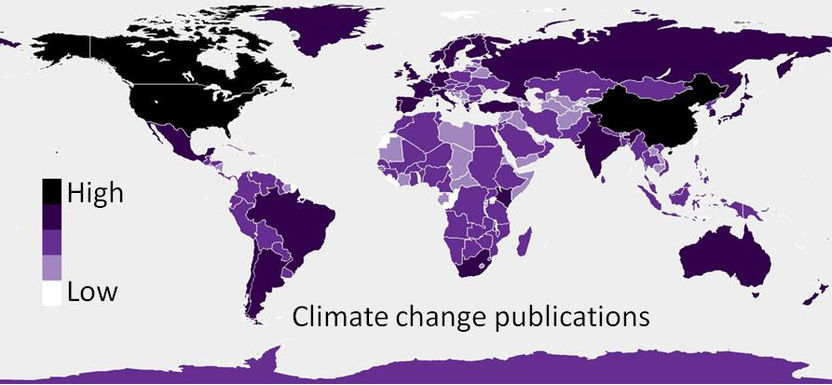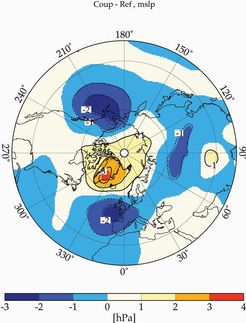Climate change research is globally skewed
Advertisement
The supply of climate change knowledge is biased towards richer countries - those that pollute the most and are least vulnerable to climate change – and skewed away from the poorer, fragile and more vulnerable regions of the world. That creates a global imbalance between the countries in need of knowledge and those that build it. This could have implications for the quality of the political decisions countries and regions make to prevent and adapt to climate change, warn the researchers behind the study from the University of Copenhagen.

Climate change research, shown here by number of publications, primarily concerns countries that are less vulnerable to climate change and have a higher emission of CO2. The countries are also politically stable, less corrupt, and have a higher investment in education and research.
University of Copenhagen
“80 % of all the climate articles we examined were published by researchers from developed countries, although these countries only account for 18 % of the world’s population. That is of concern because the need for climate research is vital in developing countries. It could have political and societal consequences if there are regional shortages of climate scientists and research to support and provide contextually relevant advice for policy makers in developing countries”, says Professor Niels Strange from the Center for Macroecology, Evolution and Climate, University of Copenhagen, which is supported by the Danish National Research Foundation.
Together with PhD student Maya Pasgaard from the Department of Food and Resource Economics at the University of Copenhagen, Niels Strange analysed over 15,000 scientific papers on climate research from 197 countries. The analysis clearly shows that the research is biased towards countries that are wealthier, better educated, more stable and less corrupt, emit the most carbon, and are less vulnerable to climate change.
As an example, the study shows that almost 30 % of the total number of publications concerns the United States of America, Canada and China, while India is the only highly vulnerable country in the top 10 list. However, Greenland and small island states like the Seychelles and the Maldives that are generally considered vulnerable, also find their way into the top 10 list if it is calculated per capita.
The content of climate studies is also skewed
The study shows that not only the authorship, but also the choice of topic in climate research, is geographically skewed:
Articles from Europe and North America are more often biased towards issues of climate change mitigation, such as emission reductions, compared with articles from the southern hemisphere. In contrast, climate research from Africa and South and Latin America deals more with issues of climate change adaptation and impacts such as droughts and diseases compared to Europe.
"The tendency is a geographical bias where climate knowledge is produced mainly in the northern hemisphere, while the most vulnerable countries are found in the southern hemisphere. The challenge for the scientific community is to improve cooperation and knowledge sharing across geographical and cultural barriers, but also between practitioners and academics. Ultimately, it will require financial support and political will, if we as a society are to address this imbalance in the fight against climate change", says Maya Pasgaard. The study was recently published online in the journal Global Environmental Change.





























































